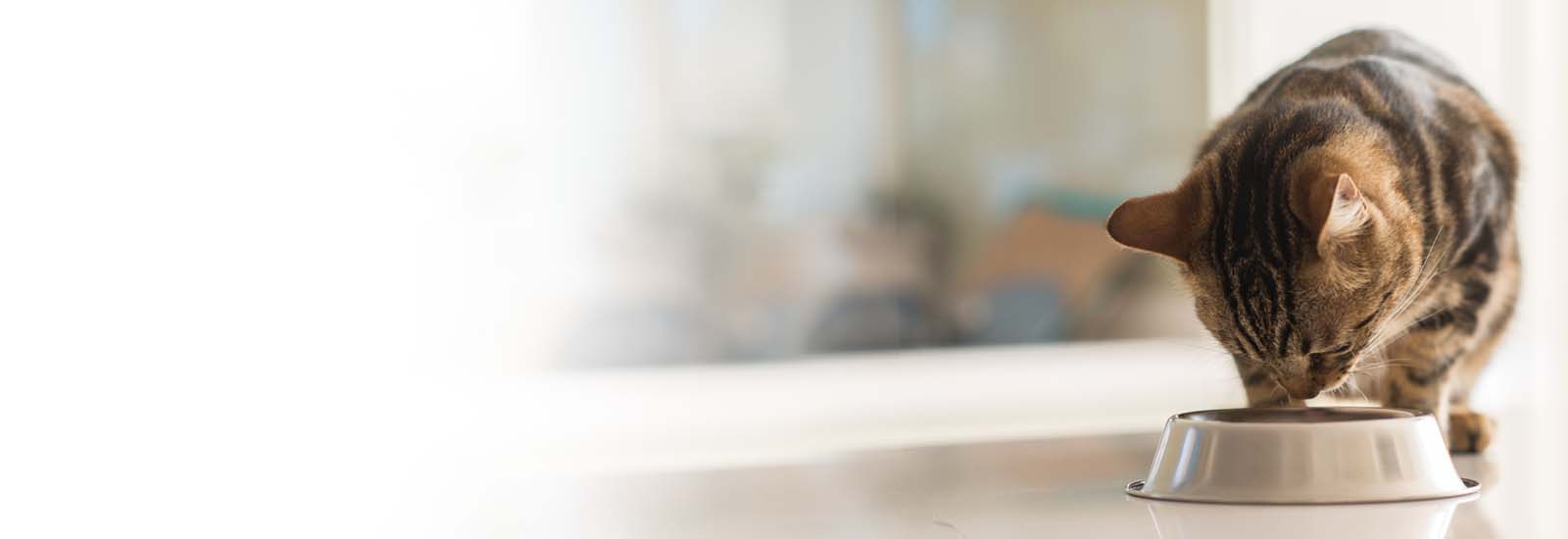What should cats never eat?
Cats are choosy animals, but sometimes curiosity simply wins them over. This is why intolerable foods and poisonous plants, cleaning agents and medicines should be kept well out of their reach. We will provide advice on what you should watch out for.
Household hazards
Many cat owners are unaware of the dangers for their pets that can lurk in the house and garden. Fortunately, cats are by nature relatively cautious and wary of new things at first, and do not immediately try everything that they find. However, sometimes curiosity wins them over and they may snatch a piece of chocolate from the living room table, try leftovers in a pot on the stove or from the table, lap up a glass of milk, chew on tulips, or drink the water from the saucer of a pot plant that you have added fertiliser to. If your pet only eats a small amount, then although there may be no visible effects, serious health problems can occur. It is therefore important to be aware of intolerable or even toxic foods as well as other sources of danger for your cat and to protect it from them. Our list shows what you should look out for.
Intolerable food and drinks
- Chocolate
Never leave a chocolate bar or a box of chocolates unattended on the table. If your cat eats them, it may lead to vomiting and diarrhoea. The higher the cocoa content, the greater the danger.
- Dairy products
Kittens produce the enzyme lactase in their bodies. This enables them to break down the milk sugar (= lactose) in their mother’s milk. The ingestion of cow’s milk, yoghurt, quark and cheese is therefore no problem for them. Adult animals, on the other hand, hardly produce any lactase. After ingesting these products, there is therefore always a risk that they will react with digestive disorders such as diarrhoea due to the lactose not being broken down and having a laxative effect.
- Eggs
Cooked eggs are not unhealthy for cats, but they should never be allowed to eat raw eggs. These contain the substance “avidin”. This can lead to a biotin deficiency, which has a negative effect on metabolic processes.
- Bread
Bread consists mostly of grains. However, cats are strict carnivores and produce only a small amount of the enzymes that digest plant carbohydrates. Excessive intake leads to digestive disorders that will have a negative effect on your pet’s health.
- Onions and garlic
Onions and garlic contain sulphur compounds that can destroy red blood cells and therefore negatively affect the transport of oxygen in the blood. For this reason you should never try to use these foods as a parasite repellent or with the intention of improving your pet’s health.
- Leftovers
The food we eat is usually seasoned. This can put a strain on the cat’s kidneys. Excessive intake of table salt can lead to poisoning. Raw or insufficiently heated pork can result in a fatal Aujeszky virus infection.
- Vegetables and solanaceous plants / nightshades
If you want to cook or prepare raw food yourself, make sure that the proportion of vegetables is very low (less than 5 per cent). Larger pieces should be avoided. Everything should be pureed or very finely chopped. It is also important, especially with solanaceous vegetables such as potatoes, peppers and tomatoes, that they have been cooked. In their raw state they will cause severe digestive disorders. Avocados are always poisonous for cats.
- Fruit
Fruit is, of course, healthy for us, but cats do not need it at all for a species-appropriate diet. It is best for cats to avoid any sort of fruit, because it contains high levels of fructose. Grapes are also toxic and can lead to kidney failure.
Poisonous plants
Although cats are carnivores, many like to nibble on cat grass. This is good for their digestion and allows them to more easily regurgitate hair from their stomachs that they have swallowed while cleaning themselves. It should therefore be part of every cat household. Without it, they may be more likely to eat other plants that could be intolerable and poisonous for them:
- Orchids
Orchids are still many people’s favourite plants. They are, however, unsuitable for a cat household, because they are poisonous.
- Tulips
These are very popular plants in gardens as well as on dining tables. However, if you have a curious pet, you should avoid them, because eating them irritates a cat’s mucous membranes and leads to kidney failure.
- Dragon tree
This much-loved houseplant produces so-called saponins to ward off predators. These are toxic for cats and cause symptoms of poisoning such as vomiting, diarrhoea and trembling when they nibble on the leaves.
- African milk tree (Euphorbia trigona)
Cats sometimes use this cactus-like plant as a substitute for a scratching post. However, it releases milky sap, which causes changes to the skin and is poisonous after oral ingestion.
- Monstera
This plant consists of large split leaves. Cats are sometimes tempted to nibble on them. This can, however, lead to difficulty in swallowing and increased salivation.
- Poinsettia
This popular plant belongs to the spurge family and contains a poisonous milky sap. It can cause tremors and seizures in cats.
- Other plant species
Not only the plants mentioned above are poisonous to cats. There are many others such as ivy, daffodils, rubber plants, aloe vera, lilies, cyclamen, Ficus benjamina and cycads.
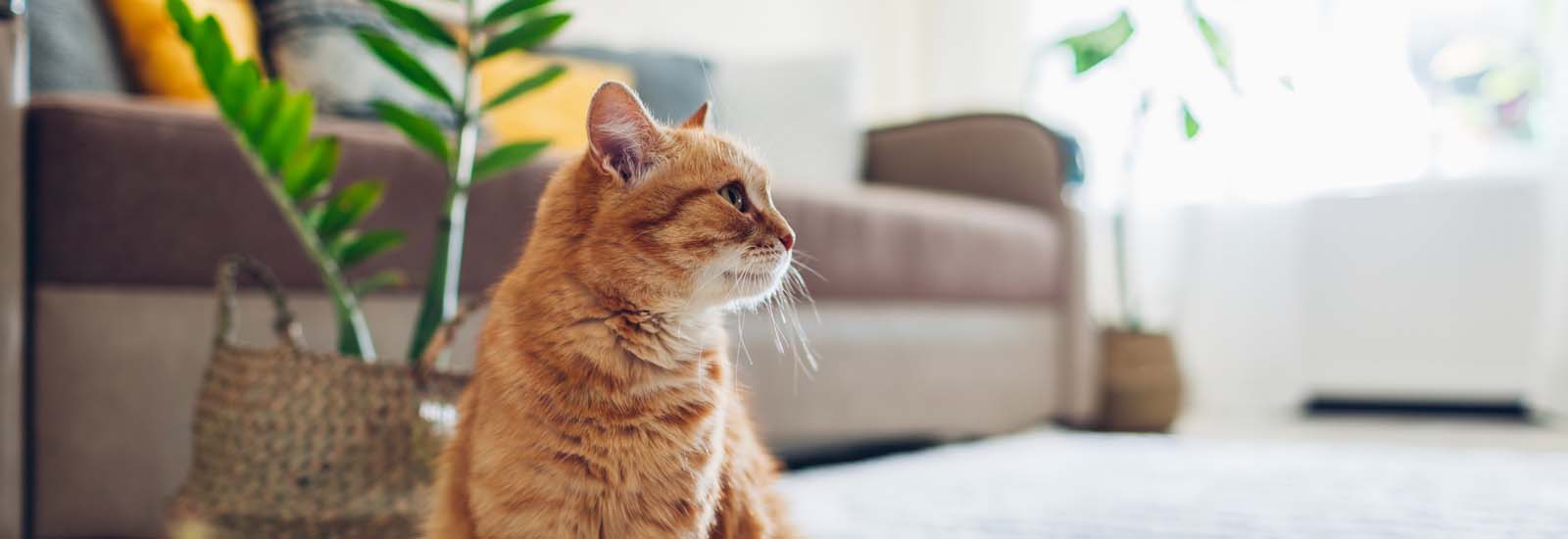
Poisonous things in the house and garden
- Plant protection products
When everything is growing nicely, we usually don’t even consider using pesticides or other products. But when plants start to deteriorate or become infested with insects, and when weeds start to take over, we may resort to fertilisers, pesticides or weed killers. Make sure that these are animal-friendly and ideally try to avoid them.
- Medicines
Never leave tablets lying around. Your cat may be tempted to play with them and accidentally swallow one. This can have very serious consequences.
- Cleaning agents
A variety of cleaning products are used in almost every household – including washing powder, floor cleaner and washing-up liquid. Cats usually steer clear of such products, but you can never be sure. They should therefore always be kept in a closed cupboard, well out of reach of your cat.
What should I do if my cat shows signs of poisoning?
If you have seen your pet eating something that is intolerable or poisonous for cats, or if you suspect this could be the case, first consider how much your cat has eaten. A minimal amount is almost always harmless. If, however, half a bar of chocolate is missing, if it has eaten tablets or come into contact with a toxic pesticide, then you should observe your cat closely and immediately take it to the vet if it shows the slightest signs of poisoning such as vomiting, trembling or convulsions. Take the food or plants that it has eaten with you. The vet will be able to diagnose the situation and estimate the amount ingested. Do not wait too long and do not resort to any home remedies. The vet will examine your cat and will be able to perform a gastric lavage, for example, and take other measures to stabilise your pet.
You may also like this
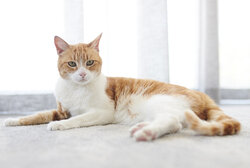
Diarrhoea in cats
Immediate measures and dietary changes in cases of diarrhoea
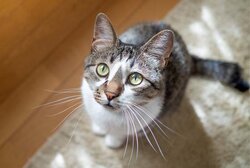
The right cat first aid kit
Our checklist shows which items are essential
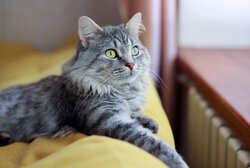
Stomach upset
Possible causes of stomach upset
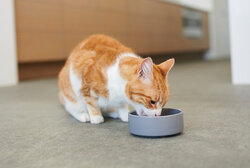
Feeding your cat
Tips on food and a healthy diet
